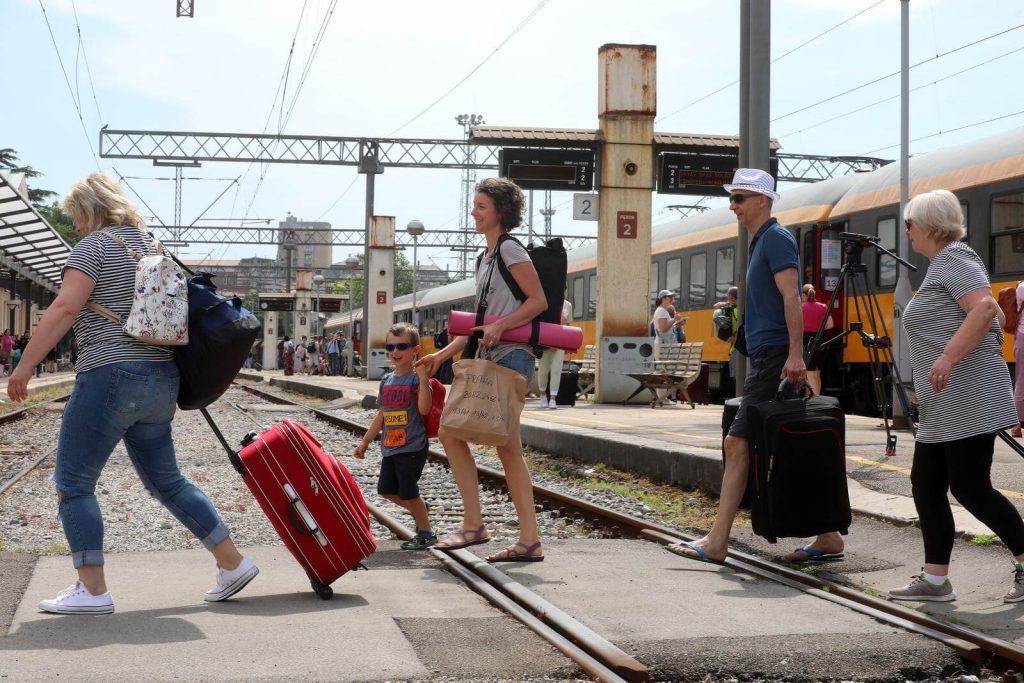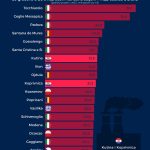Croatia is a tourist country, where around 20 percent of the national budget depends on income from tourism. Despite this, the traffic connection between Split and Rijeka, the second and third largest cities in the Republic of Croatia on the coast of the Adriatic Sea, is very poor.
Foreign tourists or Croatian citizens who want to travel from Split to Rijeka during the summer have limited options.
The first option is, of course, traveling by car. For those who do not go to the sea by car, there is only one more option: the bus. The fastest bus ride from Split to Rijeka takes about seven hours. You don’t go on the highway, which would take 2-3 hours less, but it would cost more because of tolls.
So, what about the train? A search on the Croatian Railways website shows that the train journey from Split to Rijeka takes between 22 and 29 hours, with a minimum of one transfer. Allow us to repeat – if you want to travel by train from the second largest Croatian city to the third largest Croatian city, it can take more than a day – 29 hours, writes Index.hr.
For comparison, a trip on the Trans-Siberian Railway from Moscow to Vladivostok takes six days, covering 9,289 kilometers. Split is slightly more than 400 kilometers from Rijeka, or 416 kilometers, according to Google Maps. A Trans-Siberian Railway train covers about 64 kilometers in one hour, while a Croatian Railways train covers an average of about 14 kilometers in one hour on a full-day journey from Split to Rijeka. No wonder it takes a whole day if you decide to travel from Split to Rijeka by train.
Regarding air transport, there is no direct route from Split to Rijeka. It was operated by Trade Air, but the Ministry of Transport did not extend its contract in time. As a result, they stopped flying on the Split – Rijeka route at the end of April this year.
The official Trade Air website states that they hope to connect Split and Rijeka (as well as Osijek and Pula, etc.) by air again from August 15 of this year.
It is also worth noting that the Split – Rijeka flight is a PSO line. PSO stands for Public Service Obligation. This program enables countries within the European Union to co-finance airlines for flights that are not always directly commercially profitable but are of public importance.
And what about by sea? There is no longer a night ferry line that connects Split and Rijeka, on which the famous Marko Polo ferry used to travel. The Jadrolinija Rijeka – Dubrovnik line was discontinued in 2015.
Index asked Jadrolinija why:
“The decision to cancel the Rijeka – Dubrovnik line was first made in 2012 by the then Government due to the constant decline in passenger and vehicle traffic, which was caused by the construction of highways to the south, which made vehicle journeys to destinations in Dalmatia significantly shorter, so the line recorded fewer passengers. In 2015, the line was discontinued,” Jadrolinija said.
However, it seems that this could change.
“Given all the circumstances and the development of highways, cooperation with the Maritime Faculty on a study on redefining the line is underway. Jadrolinija primarily maintains state lines connecting the islands with the mainland, and currently, there is no Rijeka – Split line maintained by Jadrolinija,” Jadrolinija revealed.
“Croatia, as a tourist destination, is well connected to the most important markets, both by road and by air, i.e., airlines, and there are also shipping lines as a link by sea,” says HTZ.
They also add that this is one of the essential prerequisites for attracting foreign guests, whose pleasant and quality stay requires a good transport infrastructure and connections within the destination, that is, the country where they are staying. The above applies to domestic tourists as well.
“Namely, with the quality transport connections of Croatian cities, we can further encourage our guests to discover other destinations and increase tourist consumption,” says HTZ.
For more, make sure to check out our dedicated travel section.








